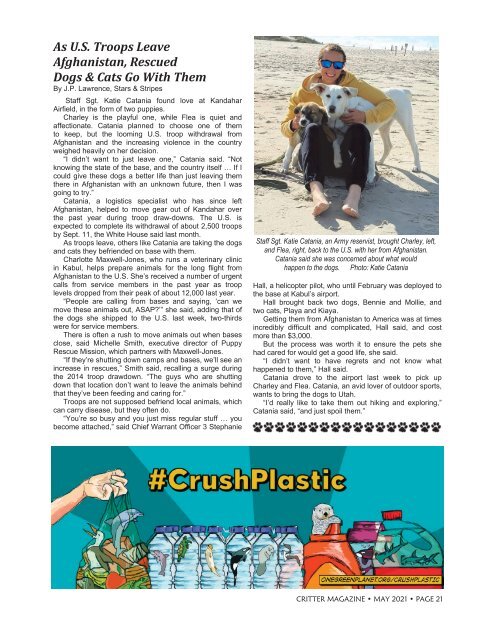Create successful ePaper yourself
Turn your PDF publications into a flip-book with our unique Google optimized e-Paper software.
As U.S. Troops Leave<br />
Afghanistan, Rescued<br />
Dogs & Cats Go With Them<br />
By J.P. Lawrence, Stars & Stripes<br />
Staff Sgt. Katie Catania found love at Kandahar<br />
Airfield, in the form of two puppies.<br />
Charley is the playful one, while Flea is quiet and<br />
affectionate. Catania planned to choose one of them<br />
to keep, but the looming U.S. troop withdrawal from<br />
Afghanistan and the increasing violence in the country<br />
weighed heavily on her decision.<br />
“I didn’t want to just leave one,” Catania said. “Not<br />
knowing the state of the base, and the country itself … If I<br />
could give these dogs a better life than just leaving them<br />
there in Afghanistan with an unknown future, then I was<br />
going to try.”<br />
Catania, a logistics specialist who has since left<br />
Afghanistan, helped to move gear out of Kandahar over<br />
the past year during troop draw-downs. The U.S. is<br />
expected to complete its withdrawal of about 2,500 troops<br />
by Sept. 11, the White House said last month.<br />
As troops leave, others like Catania are taking the dogs<br />
and cats they befriended on base with them.<br />
Charlotte Maxwell-Jones, who runs a veterinary clinic<br />
in Kabul, helps prepare animals for the long flight from<br />
Afghanistan to the U.S. She’s received a number of urgent<br />
calls from service members in the past year as troop<br />
levels dropped from their peak of about 12,000 last year.<br />
“People are calling from bases and saying, ‘can we<br />
move these animals out, ASAP?’” she said, adding that of<br />
the dogs she shipped to the U.S. last week, two-thirds<br />
were for service members.<br />
There is often a rush to move animals out when bases<br />
close, said Michelle Smith, executive director of Puppy<br />
Rescue Mission, which partners with Maxwell-Jones.<br />
“If they’re shutting down camps and bases, we’ll see an<br />
increase in rescues,” Smith said, recalling a surge during<br />
the 2014 troop drawdown. “The guys who are shutting<br />
down that location don’t want to leave the animals behind<br />
that they’ve been feeding and caring for.”<br />
Troops are not supposed befriend local animals, which<br />
can carry disease, but they often do.<br />
“You’re so busy and you just miss regular stuff … you<br />
become attached,” said Chief Warrant Officer 3 Stephanie<br />
Staff Sgt. Katie Catania, an Army reservist, brought Charley, left,<br />
and Flea, right, back to the U.S. with her from Afghanistan.<br />
Catania said she was concerned about what would<br />
happen to the dogs. Photo: Katie Catania<br />
Hall, a helicopter pilot, who until February was deployed to<br />
the base at Kabul’s airport.<br />
Hall brought back two dogs, Bennie and Mollie, and<br />
two cats, Playa and Kiaya.<br />
Getting them from Afghanistan to America was at times<br />
incredibly difficult and complicated, Hall said, and cost<br />
more than $3,000.<br />
But the process was worth it to ensure the pets she<br />
had cared for would get a good life, she said.<br />
“I didn’t want to have regrets and not know what<br />
happened to them,” Hall said.<br />
Catania drove to the airport last week to pick up<br />
Charley and Flea. Catania, an avid lover of outdoor sports,<br />
wants to bring the dogs to Utah.<br />
“I’d really like to take them out hiking and exploring,”<br />
Catania said, “and just spoil them.”<br />
CRITTER MAGAZINE • MAY 2021 • PAGE 21
















